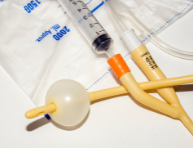How to install a male and female urinary catheter
A catheter is a tube that is inserted into the body to drain or insert fluids into a body cavity. Most commonly, a catheter is inserted through the urethra into the bladder to drain urine. If not careful, long-term use of the catheter can cause urinary tract infections. Catheters can be made of rubber, glass, metal, or elastic plastic.
Purpose of catheter insertion
- Coping with bladder distention
- For urine specimen collection
- To measure the residual urine after micturition in bladder
- To empty the bladder before and during surgery
Preparation of tools and materials
- Sterile drum containing
- Sterile gas
- Sterile Deppers
- Handscoen
- Wash
- Neirbecken
- Anatomical tweezers
- Doek
- Sterile catheter according to required size
- Place urine specimen if needed
- Urinebag
- Perlak and its base
- Disposable syringe
- Blanket
- Aquadest
- Bethadine
- Alcohol 70%
Officer Preparation
Basic knowledge of anatomy and physiology and sterility is absolutely necessary in the context of preventive measures to break the chain of spread of nosocomial infections
Skilled and experienced enough to perform the intended action
Try not to offend the sufferer, take action must be polite, slowly and carefully It is hoped that the patient has received an adequate explanation of the procedure and the purpose of the procedure
Patient Preparation
The patient clearly knows everything about the actions that will be taken by the patient or his family are required to sign an informed consent
How to insert a catheter
1. Prepare the patient: for male patients in the supine position while women in the dorsal recumbent position or Sim position
2. Adjust the light so that you get a good visualization
3. Prepare the deppers and wash, pour enough bethadine
4. Put on the handscoen and plug the hole in the patient's genitalia
5. Take the deppers with tweezers and dip them in the bethadine solution
6. Disinfect as follows: In male patients: The penis is held and directed upwards or almost perpendicular to the body to straighten the long and winding urethra so that the catheter is easily inserted. disinfection starts from the meatus including the glans penis and rotates to the base, repeated one more time and continued with alcohol. At the time of carrying out the left hand holding the penis while the right hand holding the tweezers and kept sterile. In female patients: The finger of the left hand opens the labia minora, disinfection starts from the top (clitoris), meatus and then downwards towards the rectum. This is repeated 3 times. The last deppers are left between the labia minora near the clitoris to maintain the appearance of the urethral meatus.
7. Coat the catheter with jelly from the tip evenly to a length of 10 cm for male patients and 4 cm for female patients. Especially in male patients, use jelly in rather large quantities so that the catheter is easy to enter because the urethra is convoluted
8. Insert the catheter into the meatus, at the same time the patient is asked to take a deep breath.
For male patients: The left hand holds the penis in a position perpendicular to the patient's body while opening the external urethral orifice, the right hand holds the catheter and inserts it slowly and carefully while the patient takes a deep breath. Assess the smooth insertion of the catheter if there are obstacles, stop for a moment then try again. If resistance persists, catheterization is discontinued. Place the Neirbecken under the base of the catheter before the urine comes out. Insert the catheter until the urine comes out as deep as 5 – 7.5 cm and then inserted again +/- 3 cm.
For female patients: The finger of the left hand opens the labia minora while the right hand inserts the catheter slowly while the patient takes a deep breath. assess the smooth insertion of the catheter, if there are obstacles, catheterization is stopped. Place Nierbecken under the base of the catheter before the urine comes out. Insert the catheter until the urine comes out as deep as 18-23 cm and then inserted again +/- 3 cm.
9. Take a urine specimen if necessary
10. Inflate the catheter balloon with sterile distilled water according to the volume indicated on the label specification for the catheter used
How to fix the catheter:
In male patients, the catheter is fixed with a plaster on the abdomen
In female patients, the catheter is fixed with a plaster in the groin
11. Placing the urinebag on the bed in a lower position than the bladder
12. Report the implementation and written results on the patient's status which includes: Date and time of catheter insertion
- Type and size of catheter used
- The amount, color, odor of urine and other abnormalities found
- Full name and signature of the installer
Reference
• Widjoseno Gardjito, Urology, Diagnostic and Therapeutic Guidelines Lab/UPF Surgery at RSUD Dr. Soetomo, Surabaya, 1994
• Standard Procedures for Medical Services IRD Dr. Soetomo. 1996.
• Advanced Trauma Life Support Program For Physicians, Head Injury, Committee on Trauma American College of Surgeons, IKABI Trauma Commission Translation, 1997
Thank you for reading the article How to Insert a Catheter for Men and Women" Hopefully Helpful.
